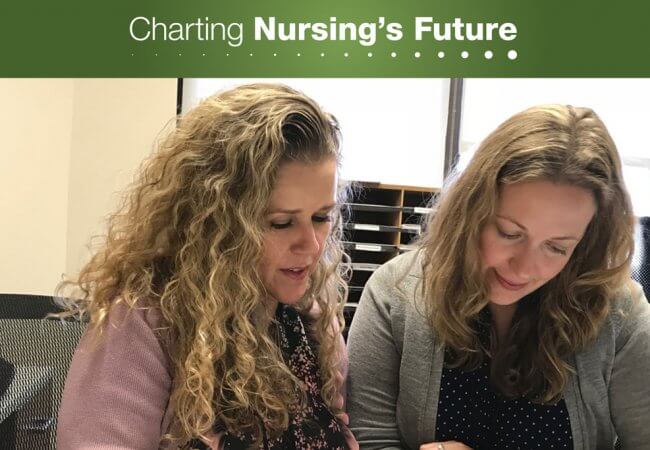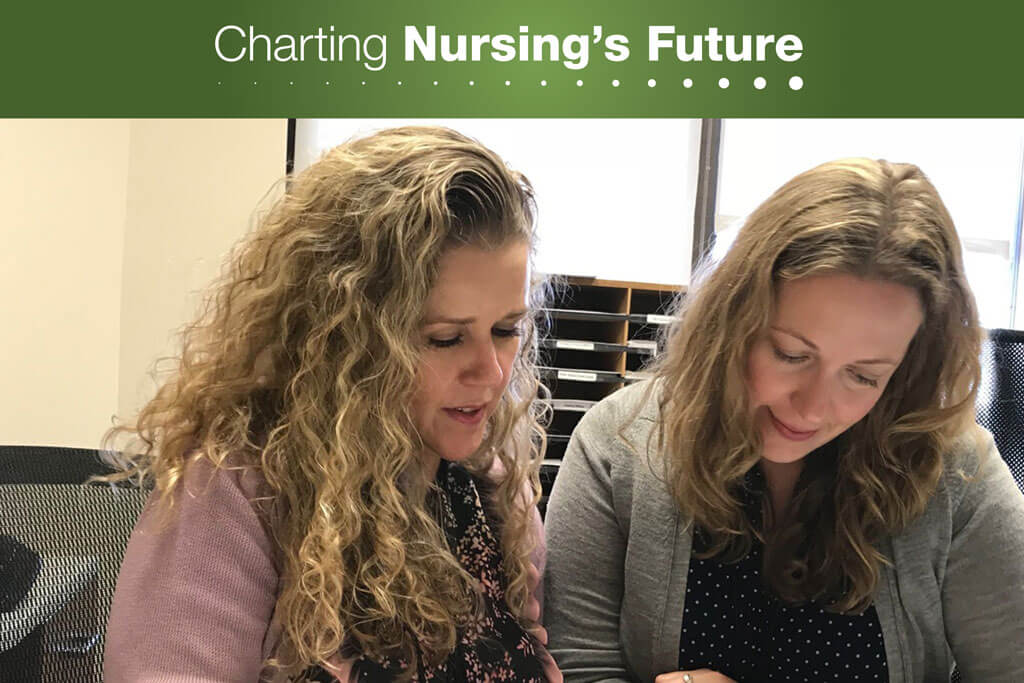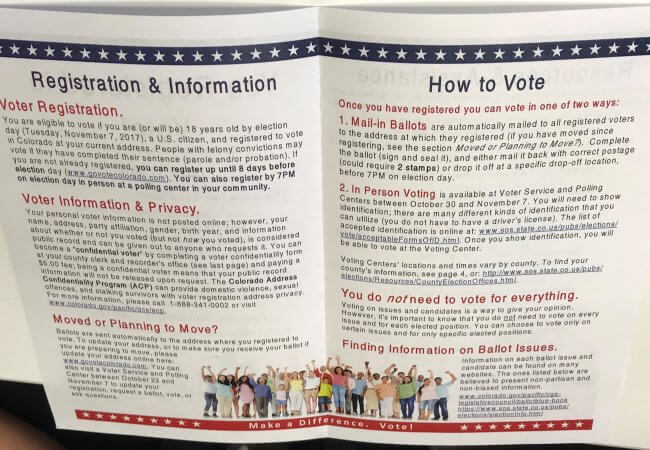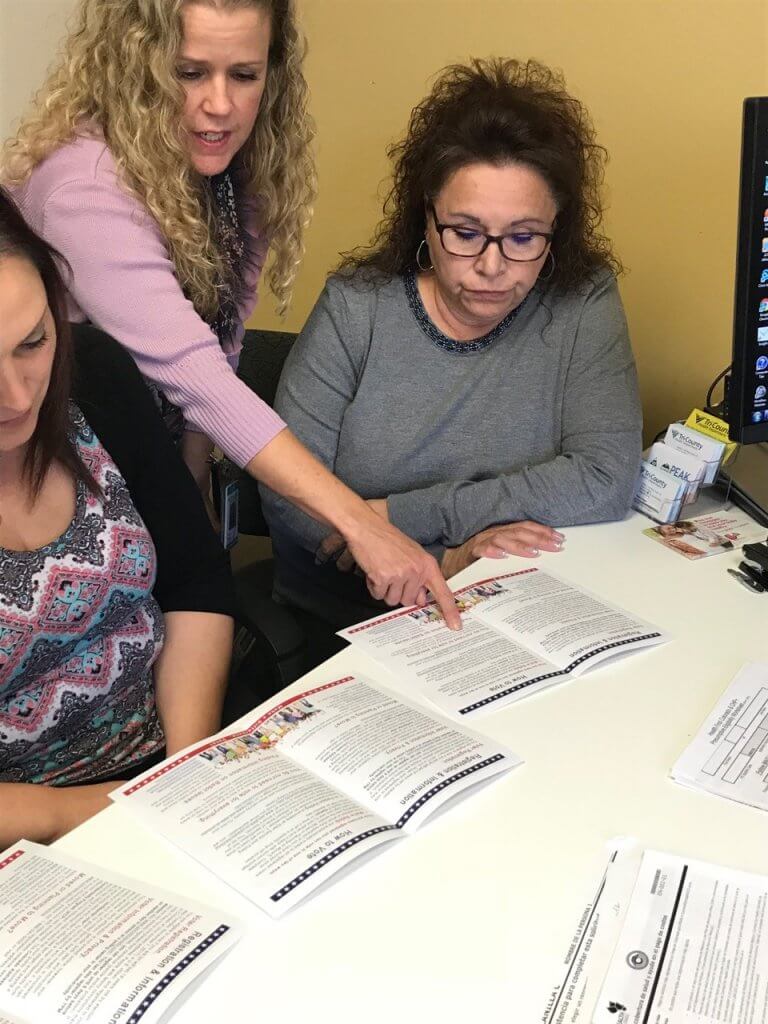
Nov 06, 2017
Nurse Encourages Voting to Build Community Health

Nurse Manager Wendy Nading, RN, ND, and Population Health Epidemiologist Callie Preheim, MSPH, review a voter registration guide they created for use by the Tri-County Health Department. Photo credit: Rachel Brand.
“Are you registered to vote?” has long been asked of people who sign up for public assistance programs. Now, a growing number of voices say voting is a measure of community health.
At the Denver area’s Tri-County Health Department, Wendy Nading, RN, ND, nurse manager, Access to Care, and Callie Preheim, MSPH, population health epidemiologist, are forging new frontiers in voter registration. Starting in mid-2016, the duo began a quality improvement effort to enhance the department’s voter registration efforts.
Going beyond the letter of the law

The Tri-County Health Department’s guide makes the processes of registering and voting easy to understand. Photo credit: Rachel Brand.
Since 1993, the National Voter Registration Act has required public assistance programs to offer enrollees registration help, but this assistance has typically amounted to little more than asking the one-sentence question, “Are you registered to vote?” If the respondent says no, the second question is, “Are you eligible to vote?” A second no ends the conversation.
Nading and Preheim recently surveyed Medicaid applicants and found 61 percent believed they were not eligible to vote. The pair does not know what percent of Medicaid applicants are ineligible to vote, but believe 61 percent is high and plan further study.
“We don’t know whether [their response] is due to the current climate of fear—‘Then I’d have to give you paperwork, and more of my information could be on file,’—or whether they simply don’t know that they are eligible,” Nading says. “We realized we had a real opportunity to go back and prompt [our clients] in ways we were not doing before.”
Voting: a social determinant of health

Nurse Manager Wendy Nading, RN, ND, shows family health coordinators Crystal Maldonado (left) and Debra Gutierrez (right), both of whom enroll new clients in Medicaid, a guide that explains how clients can register to vote. Photo credit: Rachel Brand.
Safe neighborhoods, healthy food, stable jobs, and a good education are well-known social determinants of health. Less well-recognized is the relationship between healthy communities and voting.
The number of people who are registered and participate in voting is a measure of community health, according to Healthy People 2020, a set of evidence-based, 10-year national objectives for improving the health of all Americans.
“Voting directly impacts health,” says Preheim. “Not only can you vote on things that affect your health, such as candidates that support expanded access to health care or parks and public transportation, but voting improves civic engagement, which can reduce social isolation.”
The Robert Wood Johnson Foundation Culture of Health website identifies voting as a measure of civic engagement and a key driver in building healthier communities. As the website states, “Strong turnouts on voting day and increased participation in elections are indications that individuals feel empowered to take action and want to influence change.”
Positive messages aim to encourage voting
Using Colorado state materials as a guide, Nading and Preheim developed an uplifting, easy-to-understand, four-page voter guide with three simple messages:
- You can make a difference
- Voting is easy—there are different ways to vote
- People are there to help you
Nading and Preheim plan to develop more ways of discussing eligibility that go beyond yes or no questions; train family health coordinators to use the voting guide and speaking points; translate the guide into Spanish; and resurvey their clients in six to 12 months to see if voter registration has increased. They aim to get the guide adopted throughout the health department, which serves 1.5 million residents in three counties, particularly in programs such as the Special Supplemental Nutrition Program for Women, Infants, and Children (WIC), which enrolls thousands of pregnant women in the Denver metro area each year.
